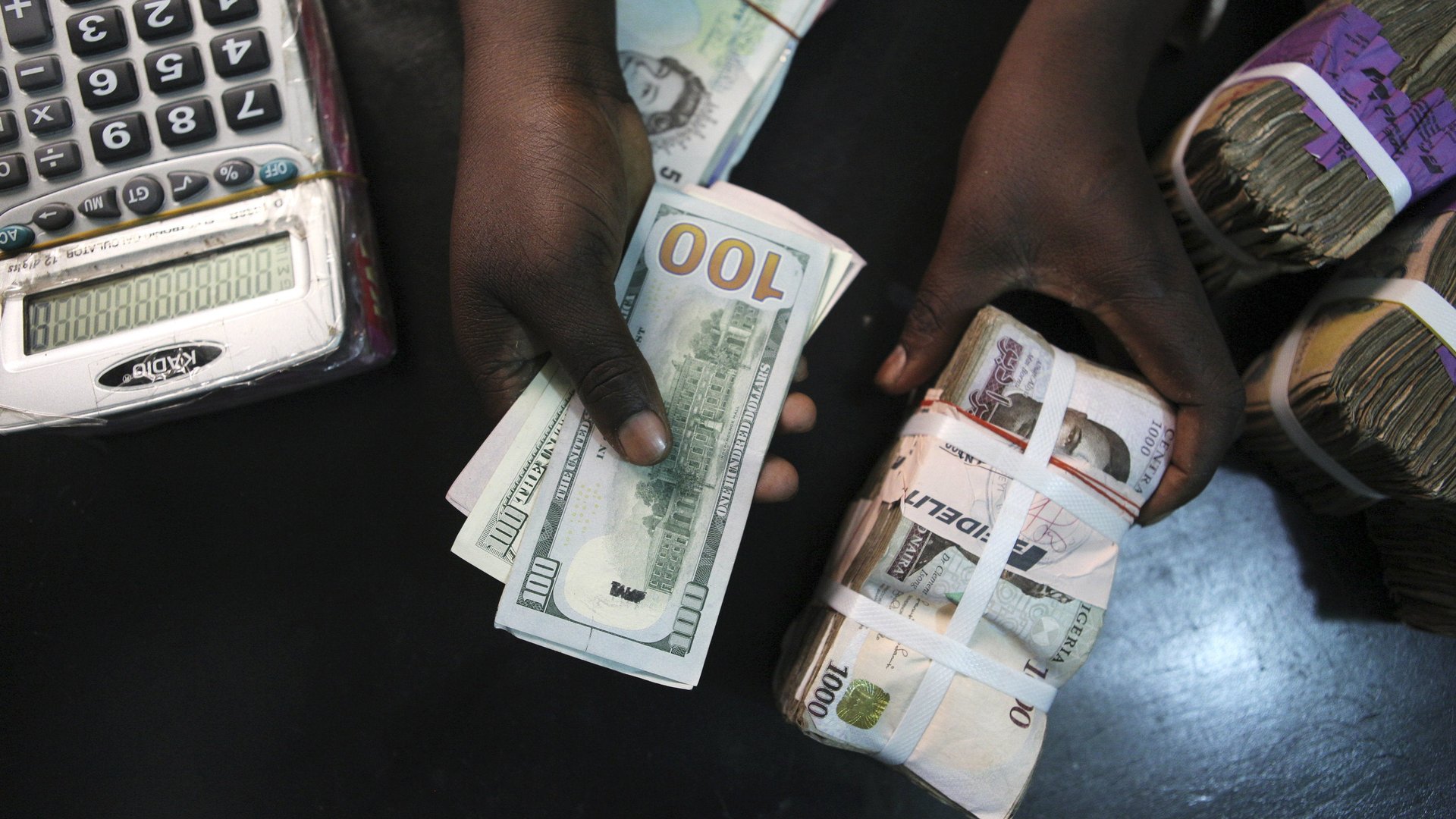In Nigeria, all anyone can talk about is the dollar—and the fate of the naira
Lagos, Nigeria


Lagos, Nigeria
It hits you almost as quickly as the humidity when you step off the plane—Nigeria is going through a currency crisis.
Even the pastor in our neighborhood area church worked it into his sermon. A prayer to have the kinds of jobs that pay in dollars instead of the shrinking naira. Amen.
Every conversation with senior executives, bankers, barbers, and street hawkers either begins or eventually makes its way to the naira’s parlous state. My taxi driver has just given me a mini-lecture on the roots of Nigeria’s foreign-exchange policy. He’s also recommended his dollar guy if I want to get a “good deal” on exchanging them for naira.
Nigeria has been on the edge in recent months, as locals watch the currency depreciate against the dollar at a rapid tick on the unofficial, but hugely influential parallel markets. Even amidst the turmoil, last week’s ride was particularly unsettling.
Although the central bank’s official rate is set at 198 naira to the dollar, on the unofficial parallel markets—which dominates most currency activity here—traders took 345 naira to the dollar at the start of the week of Feb. 22. It soon dropped further, reaching almost 400 naira. But then it strengthened and settled back near 300 naira by the end of the week. It’s now hovering around 340 naira to the dollar. In truth, these rates are imprecise and impressionistic, since they rely on informal networks of individuals and dealers responding to the forces of supply and demand.
The root of the turmoil has been the drop in oil prices over the past year and a half. Oil exports generate up to 90% of Nigeria’s foreign exchange-based revenue.
But it’s the government’s response to the problem that is causing controversy, and generating volatility.President Muhammadu Buhari has refused to “kill” the naira by devaluing the currency or relaxing its fixed-rate trading band. His reasoning—as it’s been communicated so far—is that a weaker currency means a weaker country.
In simple terms, what Buhari’s government wants to do is discourage the use of dwindling foreign-currency reserves for imports of non-essential items unrelated to key industries like energy, agriculture, and manufacturing. The idea is to reduce the country’s reliance on imports, promoting local goods instead. (Similar tactics can be seen in Russia and Venezuela, other petrostates battered by low oil prices.)
In the government’s defense, if you’re stuck in Lagos traffic it’s amazing the range of “frivolous” luxury chocolates, high-end toilet seats, and Encyclopedia Britannia sets you’ll find thrust in your face by eager street hawkers. Oh, and let’s not forget the Nigerian flags for sale, as Lagos’s resourceful street hawkers can also do irony.
Meanwhile, many economists have argued that Nigeria needs to devalue the naira. Last week, the IMF weighed in, saying Nigeria’s central bank needs to devalue its currency in order to achieve its goal of growing the economy by 4.9% in 2017—up from 3.2% this year. But there are arguments on the other side too, from some economists and (mainly) government insiders.
Part of the problem stems from uncertainty about the government’s economic strategy. Per usual, Nigerians fill in the gaps with speculation and rumor.
No one was able to explain the rapid descent of the naira early last week or its even more surprising rebound. Some people figure the strengthening was due to the end of the Chinese New Year holiday. The theory is that that since Nigerian traders do a huge amount of business with China, there was a huge influx of dollars into Nigeria when those partners returned to work. The problem is that the holiday ended on Feb. 14, nearly 10 days before the rebound.
Others claim there’s a lot of “hot money” connected to corrupt people from previous regimes trying to launder their ill-gotten gains. There’s no evidence of such a thing, but you can be sure the rumors are being argued vociferously in bars up and down the country.
It’s a never-ending discussion on TV news shows and in local shops. Retailers and businesspeople blame every wiggle in prices on the exchange rate. The standard response to my protests at a surprise increase in the price of goods or services prompts the catch-all: “Sorry brother, it’s this dollar problem.”